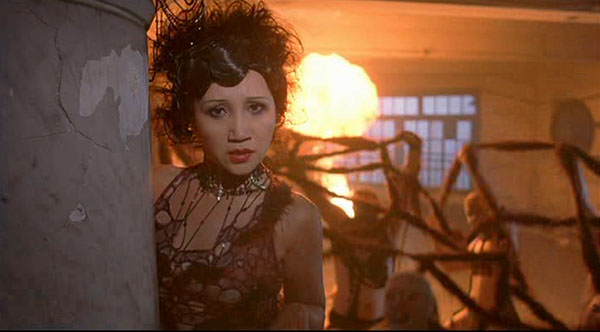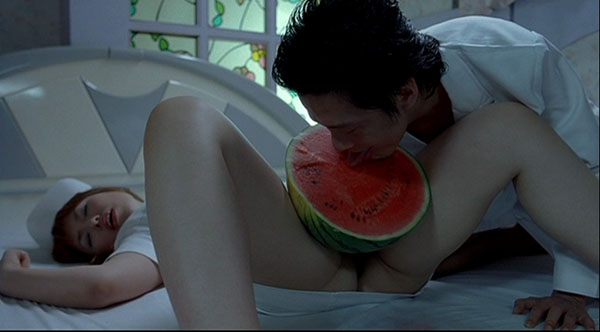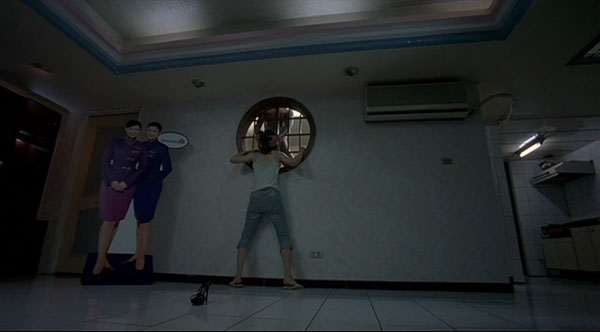Okay, I am dumbfounded. Just gonna have to look up what others said about this. There were lavish erotic song-and-dance scenes (remember: this is the director of Goodbye Dragon Inn), watermelons, a country-wide water shortage, a friendship between a quirky girl and a porn actin’ dude, and a crazily offensive ending.

Apparently it was a giant hit in Taiwan. Not here, I’m guessing. Reading the rave review in Reverse Shot, I’m thinking if this was an American indie movie by a filmmaker with no history, it’d be dismissed as an amusing, well-shot quirkfest-turned-rude. I did kinda enjoy it, but the ending left me with a bad taste in my mouth (HA HA HA). So I disliked both of Tsai’s features I’ve watched, but I’ll inevitably watch more of them, because I am a big sucker.

M. Koresky:
If the method to all this madness seems a little hard to decipher, then the final 20 minutes are a terrifying crystallization. The mild courting between Lee and Chen finally intersects with the pervasive sexual exploitation going on upstairs. Yet Tsai’s final, truly shocking images are not bolstered by casual moralizing; rather, we realize we’ve been watching the literal deterioration of a civilization. It’s in the face of Chen Shiang-chyi, and her growing moral awareness, that Tsai finds his emotional outlet. In one of the film’s sole moving shots (if not the only one, but only a second viewing can corroborate this), the camera creeps ever closer to her horrified face as she watches a particularly nasty porn scenario being enacted on the other side of a windowed wall. Her witnessing isn’t voyeurism as much as it is coming to terms with social decline (which she had been staving off through out the rest of the film, endlessly re-filling bottled water and hoarding melons). Here there is no way to reclaim what’s been lost; her head becomes nearly literally impaled on a penis. Nearly dystopic in its portrait of decline, The Wayward Cloud shows Tsai giving up a little restraint. It may be slightly out of control, but the mess suits Tsai well.

A.O. Scott:
Mr. Tsai’s placid camera seems unusually restless; the number of zooms and pans reaches double figures. At least as shocking are the fantastically costumed, sloppily choreographed musical numbers, by far the noisiest and most kinetic moments in his oeuvre. These departures, and the explicit sex, suggest an impulse to break new formal ground, but they are also evidence of imaginative fatigue.
Hsiao-Kang was selling watches on the street in “What Time Is It There?” when he encountered Shiang-chyi (Chen Shiang-chyi). In “The Wayward Cloud,” Shiang-chyi has returned from Paris (or so we must infer) to a drab apartment building in Taipei. She spends her time scavenging for water and inhabiting the wide, static shots that are Mr. Tsai’s most consistent signature. She and Hsiao-Kang cross paths and edge toward a glum, twitchy romance, consummated in a final sequence that has already become something of a conversation piece.
With this scene, Mr. Tsai joins the ranks of filmmakers — not all of them French — who have trampled the boundary that separates simulated on-screen sex from the real thing. (A long close-up erases any ambiguity …) But the display is less shocking for its sexual frankness than for its aesthetic crudity. It feels willed, aggressive and unconvincing — clammy rather than cool — in a way that suggests artistic frustration rather than discovery. The water shortage may be a metaphor for the director’s creative desiccation, which his admirers can only hope is temporary.

K. Uhlich:
Tsai’s comical sense of alienation, heightened by several ribald musical interludes, makes for uneasy bedfellows with his politically charged and quite baldly apparent thesis: that Taiwan itself is a wayward cloud, trapped between various and sundry pan-Asian interests and influences. If that reads as didactic as it felt to write then we’re one step closer to grasping the film’s highly problematic nature, not that Tsai makes much of an attempt to cloak it. One need only look at the infamous final sex sequence (which, in addition to Lee and Chen, features a comatose Japanese porn star and a Chinese airline stewardess cutout—theoretical signposts both—placed perfectly on opposite sides of a dividing wall) to experience the solidity and conviction of Tsai’s intent.

N. Lee:
The Wayward Cloud’s sexual explicitness goes hand in hand with a shift from nuanced melancholy and stealth monumentalism toward garish, befuddled negativity. The result feels … ill-suited to Tsai’s delicate sensibility. … Tsai newbies are encouraged to start anywhere but here and work their way though the contemplative angst of Rebels of the Neon Gods, the plaintive geometry of Vive L’Amour, the moist musical apocalypse of The Hole, and the chic sentimentalism of What Time Is It There?, the most overrated of Tsai’s films, yet an essential prelude to the hardcore what-the-fuck (and why-the-fuck, and who-the-fuck) of The Wayward Cloud.
